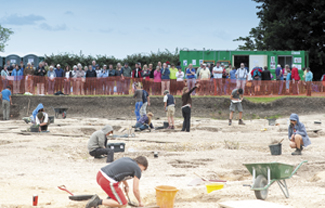Silchester excavation project shortlisted for 2016 British Archaeological Awards
Release Date 02 June 2016

Judges have today released the shortlist for this year’s British Archaeological Awards showcasing the very latest discoveries and innovations in archaeology across the UK, with Reading University’s long-term Silchester excavation shortlisted for Best Archaeological Project 2016.
The results will be announced at the British Archaeological Awards ceremony at the British Museum in London on 11 July, compèred by ‘Meet the Ancestors’ archaeologist and TV presenter Julian Richards.
Professor Michael Fulford, Project Director and Professor in Archaeology at the University of Reading, said:
“This is wonderful news for the Silchester Town Life Project - a heartwarming acknowledgement of the contributions of the thousands of participants and supporters who have made - and are continuing to make - this project happen. Silchester has already revolutionised our understanding of daily life in the Roman town and of the sophistication of the inhabitants of the Iron Age town which preceded it."
Deborah Williams, Chair of the British Archaeological Awards said:
“The entries this year reflect the incredible wealth and range of archaeology that is going on across the United Kingdom, the quality and expertise of our world-leading archaeologists, and the ever increasing fascination of the public with the history and archaeology of their local area."
John Lewis, Chair of the British Archaeological Awards judging panel for the Best Archaeological Project Award commented on the Silchester project:
“The aim of this long-running project is the publication of the total excavation of a large sample (25%) of one insula (block) to characterise the changing nature of the occupation of the Roman town at Silchester. The Judges were impressed with the way the project maximised environmental techniques and the development and use of a sophisticated database to aid analysis and make the findings accessible for future generations. The project has had a long-standing programme of public engagement, with many thousands of visitors each year.“
The British Archaeological Awards entries are judged by independent panels made up of leading experts from across the archaeology field in the UK, including both professional and voluntary sectors and aim to celebrate and share the best of British archaeology with the public.
Notes:
See the shortlisted projects at www.archaeologicalawards.com and follow the Awards on twitter at @BAAWARDSUK. Winners will be announced on the website of the British Archaeological Awards following the ceremony on 11 July: www.archaeologicalawards.org.uk
The British Archaeological Awards take place every two years and are managed by an independent charity, chaired by Deborah Williams of Historic England, and trustees from across the archaeology profession. The 2016 Awards are sponsored by the Robert Kiln Trust, The Society of Antiquaries of London, The British Museum, Portable Antiquities Scheme, Historic England, the Chartered Institute for Archaeologists, Archaeology Scotland, Historic Environment Scotland, and Cadw.
Established in 1976 and now in their 38th year, the Awards encompass five categories and a discretionary awards for Outstanding Achievement and Best Discovery. Their aim is to advance public education in the study and practice of archaeology in all its aspects in the United Kingdom and in particular the granting of awards for excellence or other appropriate reasons.
The Awards’ mission to be recognised and valued by archaeologists, those they work with and the wider public to facilitate and celebrate good practice in archaeology, raise the profile of the discipline and contribute to a greater recognition of the academic, social, environmental and public relations value of archaeology.